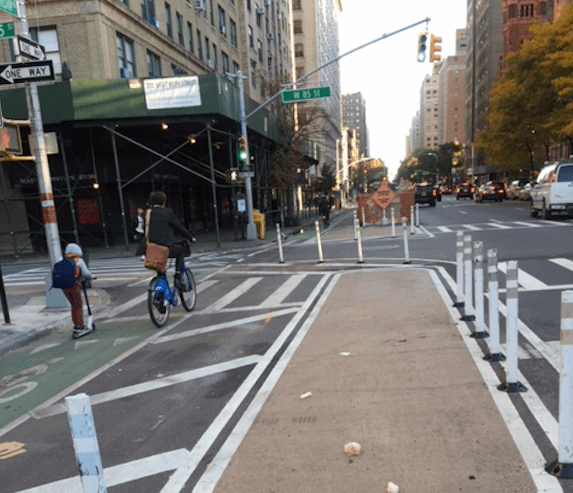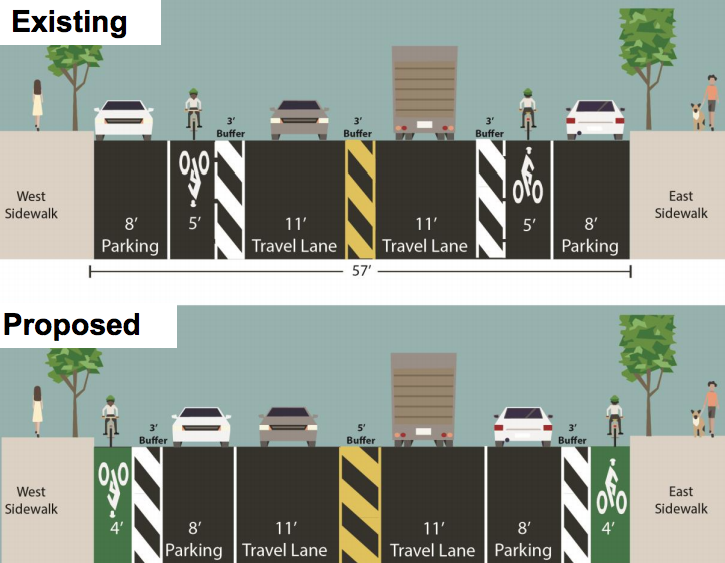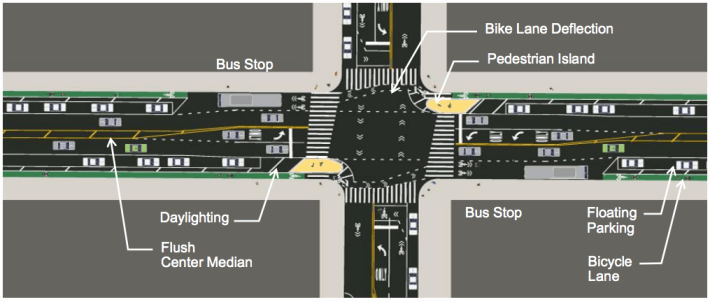Last night, DOT presented the plan for protected bike lanes and safer pedestrian crossings on Ninth Street between Prospect Park and Third Avenue [PDF]. The Brooklyn Community Board 6 transportation committee unanimously endorsed the project.
DOT moved swiftly to redesign Ninth Street after the horrific March 5 crash in which Dorothy Bruns struck and killed two small children, Joshua Lew and Abigail Blumenstein, driving west at Fifth Avenue. Bruns also injured their mothers, Lauren Lew and Ruthie Ann Blumenstein, terminating Blumenstein's pregnancy.
In May, DOT Commissioner Polly Trottenberg said the redesign is a mayoral priority and will go in this summer with or without a community board endorsement. Implementation is scheduled for later this summer.
While Ninth Street has buffered bike lanes, it remains wide for a street with just two through lanes for motor vehicles, which encourages speeding, especially for westbound drivers going downhill. Crossing distances are long, and some sections of the bike lane are constantly blocked by double-parked vehicles.
"I avoid Ninth Street with my children," said Sarah Glacel, who bikes with her children and brought her 6-year-old and 8-year-old daughters to the meeting. "I'm scared to death of it because it's dangerous."
The redesign shortens crossing distances 26 percent. Flipping the bike lane and the parking lane visually narrows the roadway, which should reduce speeding. Bike lanes will run curbside, where double-parking won't interfere. At four feet wide with a three-foot buffer, the bike lanes are on the narrow side, though DOT has recently added protected bike lanes with the same seven-foot horizontal clearance on busier biking streets than Ninth Street.
At intersections, the redesign retains the left turn pockets for motor vehicles, adding "qwick kurbs" along the center line to prevent drivers from cutting corners.
DOT also plans to implement versions of the "off-set crossing" design it's been testing in Manhattan over the past year. The treatment consists of painted pedestrian islands and plastic posts that lead motorists to take slower turns and make cyclists and pedestrians more visible to them. DOT also plans to "daylight" every intersection, removing parking from the area closest to the crosswalk to improve visibility.

Bus stops will remain on the sidewalk, however, which means at those locations there will be no pedestrian islands. DOT's Ted Wright said the agency likes the idea of floating bus stops on Ninth Street, but that they would necessitate the reconstruction of street corners, and DOT lacks the budget for implementation at this time.
The absence of concrete concerned some committee members and Council Member Brad Lander, who was not in attendance but sent a surrogate to read a statement urging DOT to pursue more robust measures in a future capital redesign. He suggested raised crosswalks at busy intersections like Ninth Street and Fifth Avenue.
A few parents in the room also expressed the feeling that the bike lane would benefit cyclists, but not pedestrians. But redesigns that include protected bike lanes are some of DOT's biggest pedestrian safety success stories. Across the city, protected lanes have resulted in a 22 percent reduction in pedestrian injuries, and a 17 percent reduction in total crashes with injuries, according to city data.
Most others raved about the plan, urging DOT to be more ambitious.
"I really think Ninth Street should be a model street. We're in a family-dense neighborhood," said Kathy Park Price, who shared a drawing by her 4-year-old and 6-year-old children of their ideal street redesign, which featured neckdowns, planters in the painted islands, and crosswalks with art (and unicorns).







